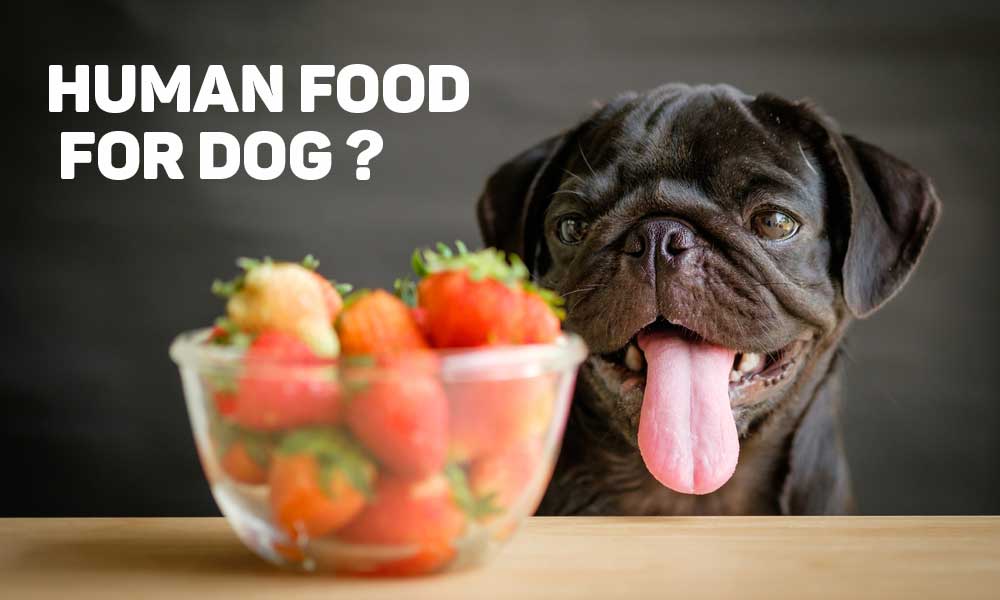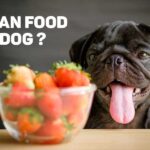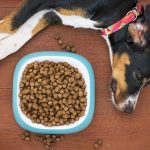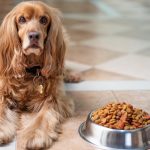People who are committed to dogs are often very compassionate individuals. They open their hearts and homes to their furry friends, and some even allow their dogs to sleep on their beds. It might seem natural to share our favourite human foods with our beloved dogs, but is it necessary to know what human food can dogs eat. Many foods that humans can eat without any issues, including various fruits and vegetables, can be harmful to dogs, leading to serious health complications. Conversely, some human foods can be safely added to a dog’s diet and may offer benefits like enhanced joint health, improved breath, and immunity to allergies.
However, before you indulge your dog with the foods you enjoy, it’s essential to know which ones are safe and which could necessitate an urgent trip to the veterinarian. It’s also vital to remember that even healthy foods, when given in large quantities, can contribute to canine obesity, a significant health issue for dogs in the U.S. Therefore, always prioritize feeding your dog high-quality dog food as the primary part of their diet.
what human food can dogs eat ?
| Food Name | Brief Information |
|---|---|
| Carrots | Safe and nutritious, rich in antioxidants, vitamins, minerals, and fibre. |
| Peanut Butter | Healthy and safe treat for dogs in moderate amounts, but should be plain and unsalted. |
| Eggs | Cooked eggs are safe and nutritious for dogs, providing vitamins, minerals, and protein. |
| Salmon | Cooked, boneless salmon is safe and healthy, providing omega-3 fatty acids. |
| Blueberries | Fresh pineapple is safe in small amounts, full of vitamins, minerals, and fibre. |
| Popcorn | Plain, air-popped popcorn is safe as an occasional treat. Contains riboflavin and thiamine. |
| Pineapple | Plain oatmeal is safe, providing fibre, vitamins, and minerals. |
| Watermelon | Safe without rind or seeds, low in calories, and packed with nutrients. |
| Bread | Plain bread is safe in small amounts. Homemade breads are a better option than store-bought. |
| Blackberries | Safe, low in calories, and rich in vitamins, minerals, and antioxidants. |
| Corn | Safe in moderate amounts, a good source of vitamins and minerals. |
| Green Peas | Generally safe, low in calories, and high in nutrients. |
| Oatmeal | Safe in moderation, high in fibre, vitamins, and minerals. |
| Apples | Sliced apples are safe, providing vitamins, minerals, and antioxidants. |
| Broccoli | Safe in moderation, low-calorie, and high in nutrients. |
| Chicken | Cooked chicken is safe and healthy, an excellent source of protein. |
| Sweet Potatoes | Safe in moderate amounts, rich in vitamin A. |
| Coconut | Safe, and coconut oil may benefit skin and fur. |
| Pork | Cooked pork without added spices or sauces is safe. |
| Mango | Safe as an occasional treat, providing several vitamins and minerals. |
| Honey | Safe in limited amounts. Can help with allergies and be used as a topical treatment for burns and superficial cuts. |
| Rice | Plain and cooked brown or white rice is safe. |
| Beef | Lean beef is safe, an excellent source of protein and nutrients. |
| Bananas | Safe in moderation, low in calories, and high in nutrients. |
| Strawberries | Safe in small quantities, high in nutrients, and low in calories. |
| Oranges | Plain, cooked shrimp is safe, and an excellent source of protein, vitamins, and minerals. |
| Mushrooms | Store-bought mushrooms like portobello are safe. |
| Potatoes | Cooked potatoes are safe, but raw potatoes contain solanine, which is toxic. |
| Celery | Safe in small amounts, low in calories, and an excellent source of vitamins and minerals. |
| Cherries | Fresh, pitted cherries are safe in moderate amounts. |
| Shrimp | Safely, remove excess fat and skin, and check for bones. |
| Cashews | Safe in small quantities, unsalted. Contain calcium, magnesium, antioxidants, and proteins. |
| Cheese | Safe in small to moderate quantities, lower-fat varieties like cottage cheese or mozzarella are preferable. |
| Fish | Safe, especially salmon and sardines. Fully cooked and cooled, and bones removed. |
| Ham | Safe but not the healthiest option. High in sodium and fat. |
| Milk | Safe for dogs that are not lactose-intolerant. |
| Peanuts | Safe in moderation, packed with good fats and proteins. Avoid salted peanuts. |
| Quinoa | Safe and a healthy alternative to corn, wheat, and soy. |
| Tuna | Safe in small amounts, cooked, fresh tuna is an excellent source of omega-3 fatty acids. |
| Turkey | Safe, great sources of protein, essential fatty acids, and fibre. |
| Wheat/Grains | Safe, plain yoghurt is a good snack for dogs. Avoid added sugar and artificial sweeteners. |
| Yogurt | Yoghurt |
Foods Harmful for Dogs
| Food Name | Brief Information |
|---|---|
| Grapes and Raisins | Contains a toxin called persin, which is poisonous to dogs, may lead to breathing difficulties and death. |
| Salt | Excessive intake may lead to salt poisoning or water deprivation. |
| Chocolate | Contains theobromine and caffeine, which dogs cannot metabolize, leading to serious complications. |
| Macadamia Nuts | Contain an unknown toxin that may lead to vomiting, muscle weakness, tremors, and other symptoms. |
| Onions | Contains thiosulfates, toxic to dogs, may damage red blood cells and lead to anaemia. |
| Avocado | Contain N-propyl disulfide, toxic to dogs, can damage red blood cells and cause anaemia. |
| Garlic | Contains a toxin called persin, which is poisonous to dogs, and may lead to breathing difficulties and death. |
| Coffee and Tea | Dangerous due to caffeine content, may lead to hyperactivity, vomiting, diarrhea, elevated heart rate, seizures, and tremors. |
| Xylitol | May lead to ethanol poisoning, causing tiredness, lack of coordination, seizures, vomiting, and diarrhoea. |
| Alcohol | It may lead to alcohol poisoning and death, and cause severe bloating. |
| Lemons and Limes | Skins contain psoralen, which can cause gastrointestinal symptoms and more severe symptoms in large amounts. |
| Raw Yeast Dough | Contains myristicin, toxic in large amounts, which may cause various symptoms including seizures. |
| Nutmeg | Can block the oesophagus or tear the windpipe if not chewed completely. Salted almonds are especially dangerous. |
| Almonds | Sugar substitutes may lead to a rapid drop in blood sugar levels, muscle weakness, seizures, liver damage, and death. |
| Cinnamon | It can irritate the inside of dogs’ mouths, lower blood sugar too much, and lead to diarrhoea, vomiting, increased or decreased heart rate, and liver disease. |
| Ice Cream | Contains lots of sugar and some dogs may be lactose-intolerant. |
Please keep in mind that the information presented is generic in nature and may not apply to all pets. Before introducing new items to your dog’s diet, always speak with a veterinarian, especially if they have unique health issues or nutritional demands.











